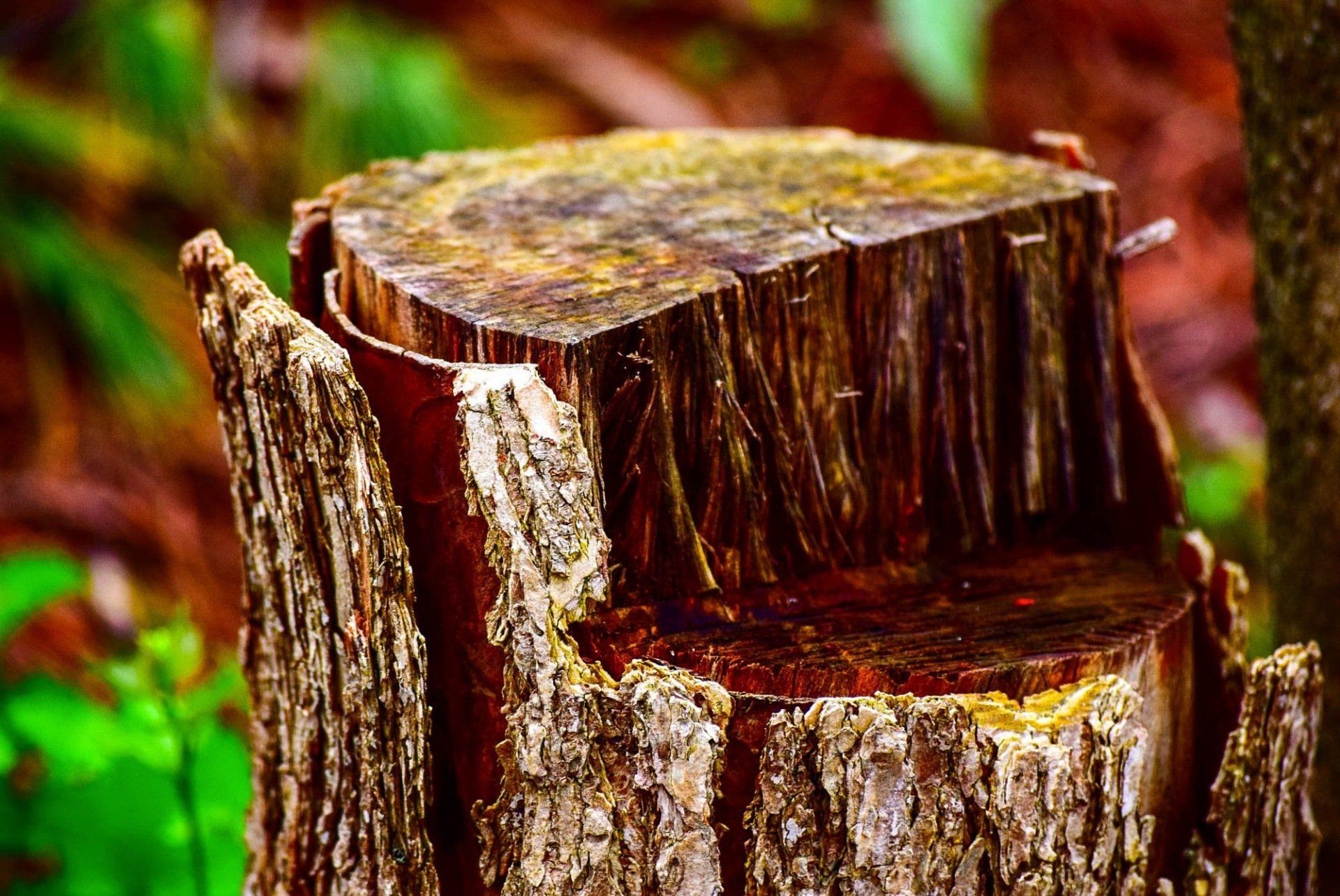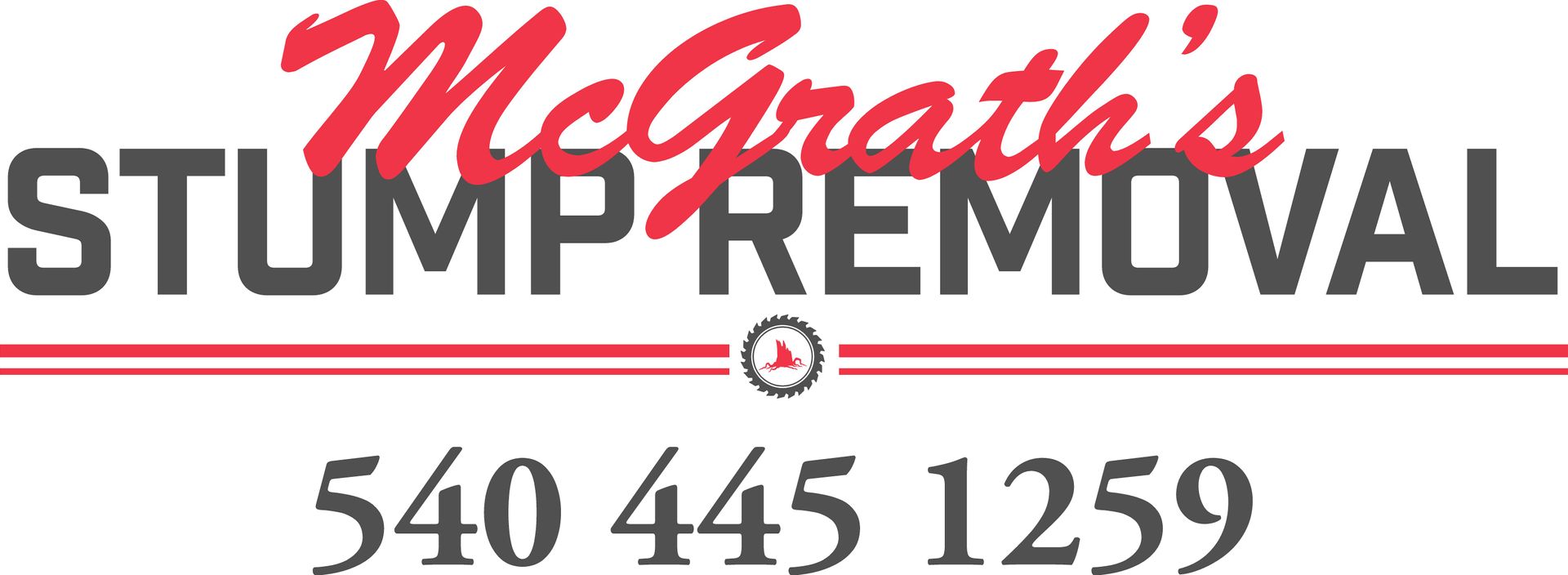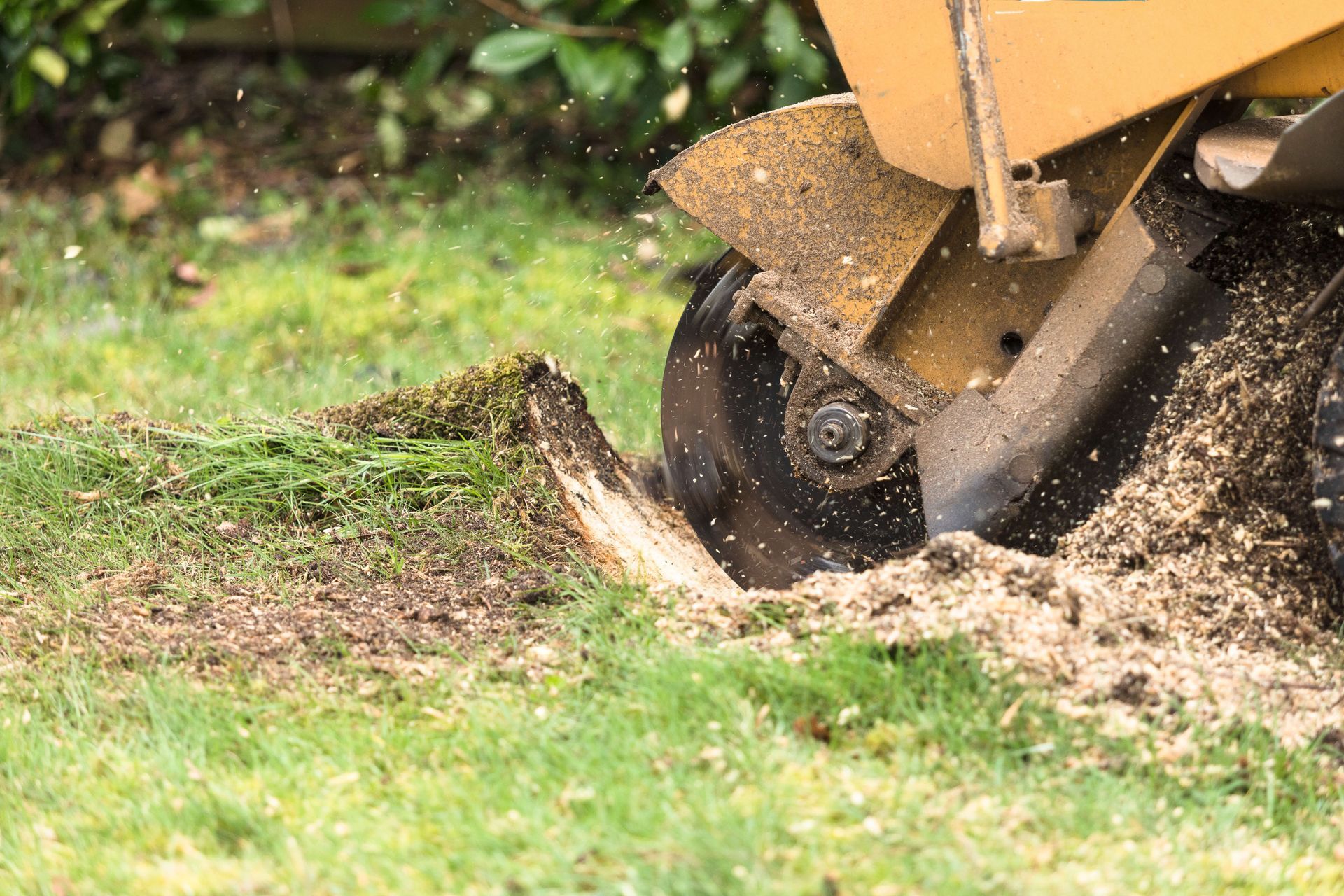Professional vs. DIY Debris Cleanup: What You Need to Know
What Is Debris Cleanup
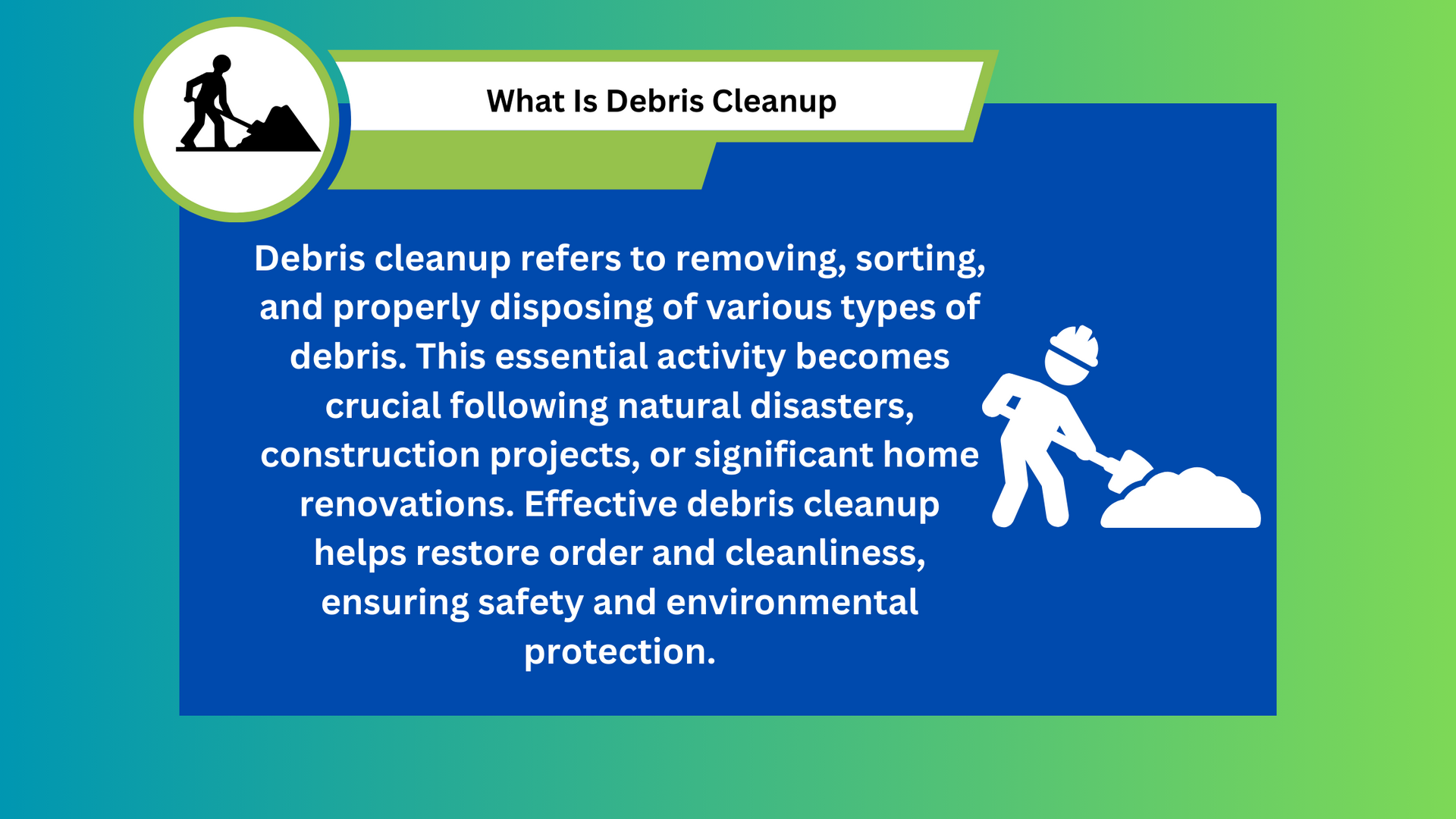
Debris cleanup refers to removing, sorting, and properly disposing of various types of debris. This essential activity becomes crucial following natural disasters, construction projects, or significant home renovations. Effective debris cleanup helps restore order and cleanliness, ensuring safety and environmental protection.
The process involves identifying the type of debris—ranging from natural materials like fallen trees and rocks to construction waste such as concrete and metal scraps—and determining the most appropriate method for its removal and disposal. Sometimes, homeowners might opt for DIY debris cleanup for more minor, manageable tasks. However, hiring professional services is often safer and more efficient for larger-scale or hazardous situations. By addressing debris cleanup responsibly, individuals contribute significantly to maintaining a safe and clean environment, adhering to local regulations, and promoting sustainable practices.
DIY Debris Cleanup
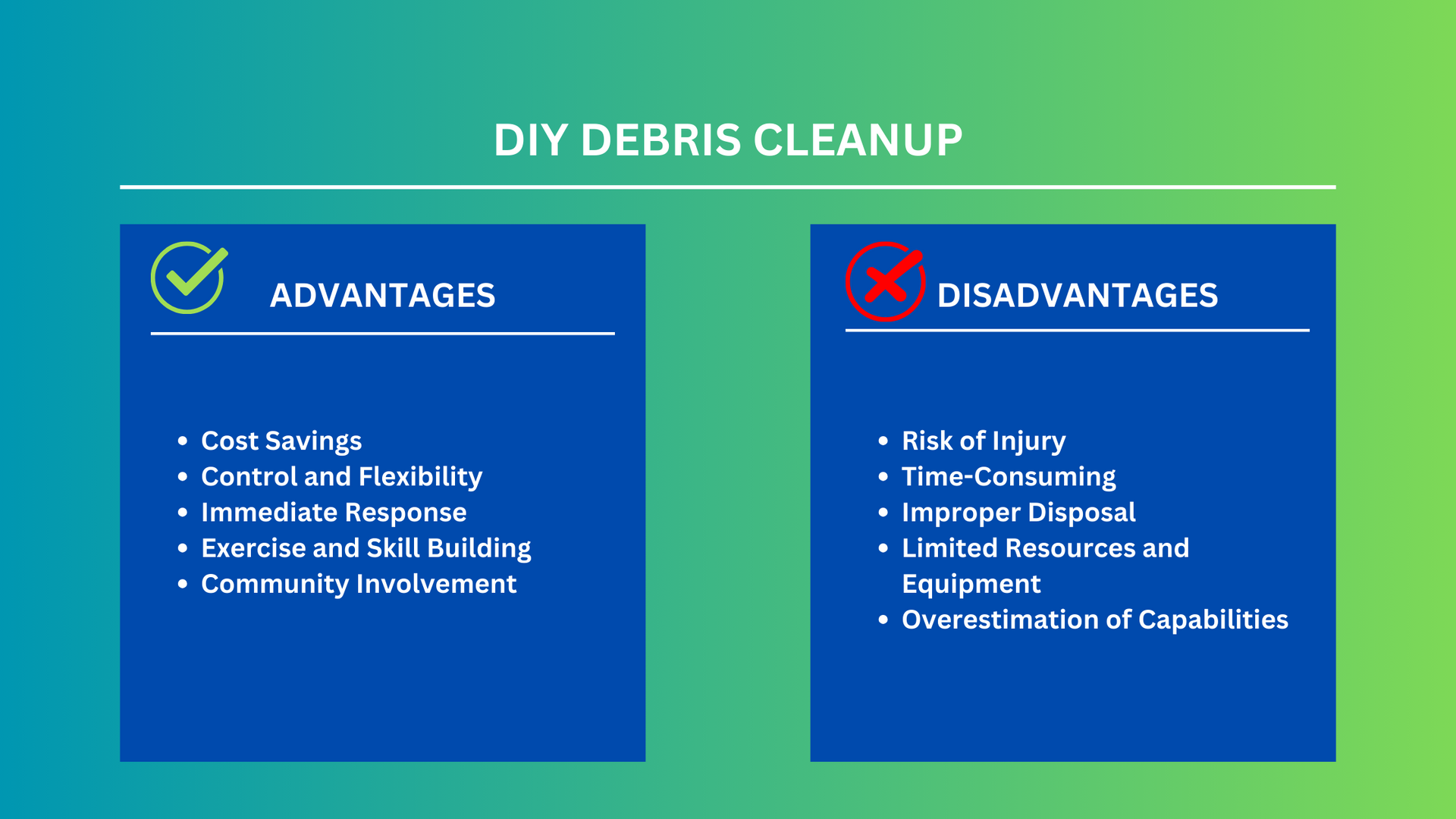
DIY debris cleanup refers to individuals or groups clearing, sorting, and disposing of debris without professional services. This approach is commonly seen in residential or smaller-scale scenarios where the debris is manageable and does not include hazardous materials.
Advantages of DIY Debris Cleanup
- Cost Savings: One of the most appealing aspects of DIY debris cleanup is the potential for cost savings. Professional services can be expensive, and doing the job yourself can significantly reduce or even eliminate these costs.
- Control and Flexibility: When you handle debris cleanup, you have complete control over the process. You can decide when to start, what pace to work at, and how to dispose of the materials. This flexibility can be particularly beneficial when working around personal schedules or specific project timelines.
- Immediate Response: In DIY debris cleanup, you can start immediately without waiting for available professional services. This immediate response can be crucial when debris poses a direct risk to safety or further property damage.
- Exercise and Skill Building: Debris cleanup can be physically demanding, providing a good form of exercise. Tackling such tasks can help you develop valuable skills and better understand property maintenance and repair.
- Community Involvement: Engaging in DIY debris cleanup, especially in the aftermath of a community-wide event like a storm, can foster a sense of community. Neighbors are helping neighbors speed up the cleanup process and strengthen community bonds.
Disadvantages of DIY Debris Cleanup
- Risk of Injury: Without professional training and equipment, the risk of injury during DIY debris cleanup can be significantly higher. Mishandling heavy, sharp, or otherwise dangerous materials can lead to accidents.
- Time-Consuming: DIY debris cleanup can be extremely time-consuming, especially for individuals who are not experienced. This can lead to longer project times and potential delays in other areas.
- Improper Disposal: Knowing how to properly dispose of different types of debris, especially hazardous materials, is crucial. DIY efforts might lead to improper disposal, which can have environmental and legal consequences.
- Limited Resources and Equipment: Professional debris cleanup teams come equipped with specialized tools and vehicles. With access to these resources, DIY efforts can be more efficient and effective.
- Overestimation of Capabilities: Individuals often overestimate their ability to handle large or complex debris cleanup tasks. This overestimation can lead to incomplete or poorly executed cleanup efforts, potentially necessitating later professional intervention.
Professional Debris Cleanup
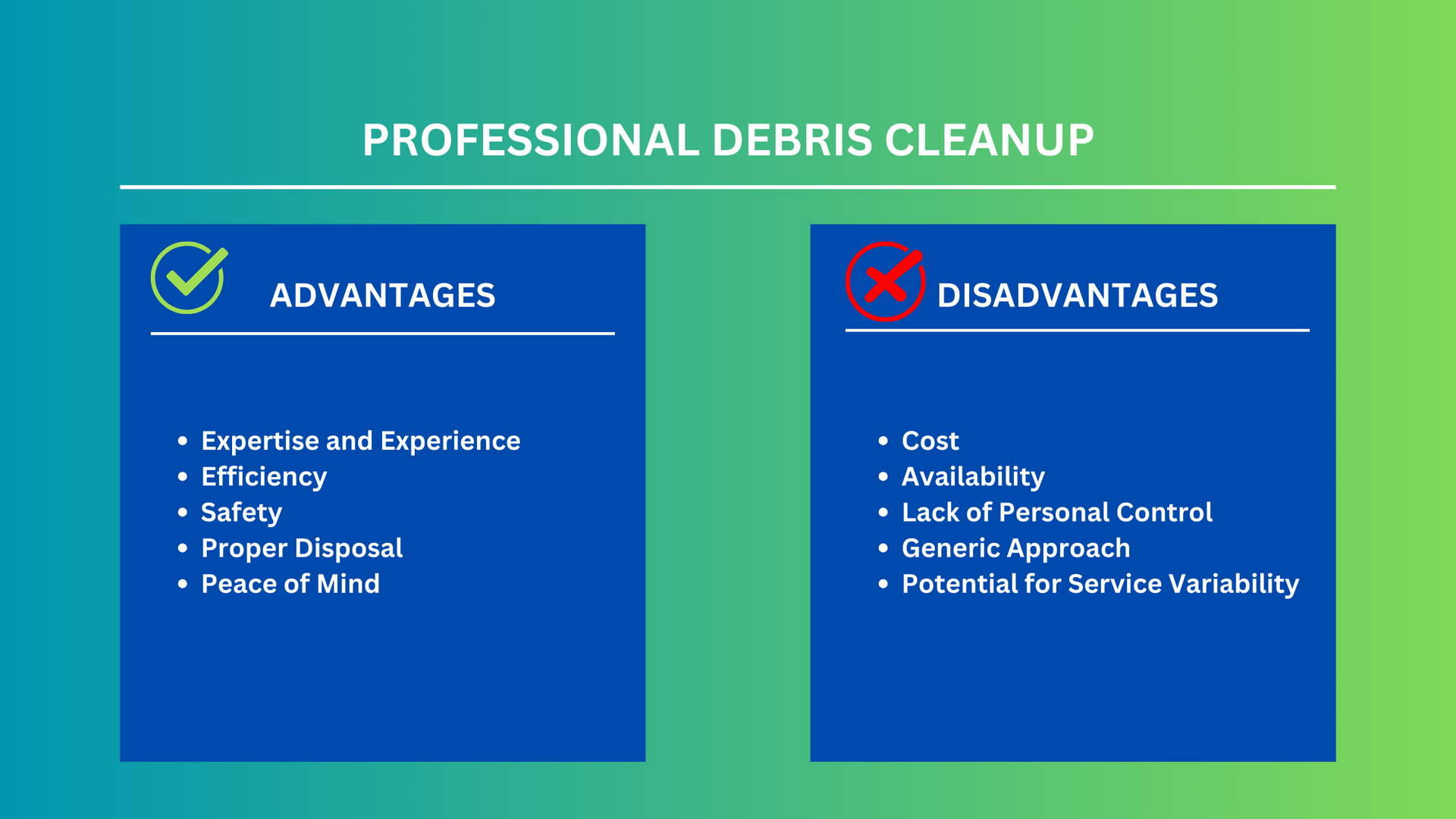
Professional debris cleanup refers to the services provided by expert teams equipped with the necessary tools, knowledge, and experience to handle various debris efficiently and safely. These services are often utilized when the debris is extensive, potentially hazardous, or requires specialized disposal.
Advantages of Professional Debris Cleanup
- Expertise and Experience: Professionals bring years of experience and expertise in handling different types of debris, including hazardous materials. They are trained to identify and deal with various debris types, ensuring the cleanup is thorough and complies with all safety standards.
- Efficiency: Professional teams have the tools and techniques to expedite cleanup. Their efficiency saves time, especially in large-scale or complex situations where DIY efforts might prolong the cleanup.
- Safety: Debris cleanup can be risky, involving sharp objects, unstable structures, or hazardous materials. Professionals are trained in safety protocols, reducing the risk of injury or accidents during the cleanup process.
- Proper Disposal: Professional debris cleanup services ensure that waste is disposed of responsibly and complies with local regulations. They often have access to recycling facilities and disposal sites unavailable to the general public.
- Peace of Mind: Hiring professionals can offer peace of mind, knowing that the cleanup is handled thoroughly and responsibly. This is especially important in stressful situations like post-disaster cleanups, where focusing on recovery is crucial.
Disadvantages of Professional Debris Cleanup
- Cost: The cost is the most significant drawback of professional debris cleanup services. Depending on the project's scope, these services can be expensive, making DIY options more appealing for those on a tight budget.
- Availability: In times of widespread need, such as after a natural disaster, the high demand for professional services can lead to availability issues. This could delay the cleanup process, which can be problematic in urgent situations.
- Lack of Personal Control: Some individuals prefer direct control over the cleanup, especially in sensitive environments like their homes. Relying on professionals means relinquishing this control.
- Generic Approach: Professional services might adopt a one-size-fits-all approach, aligning with only some clients' specific needs or preferences. This can lead to dissatisfaction if the service doesn't meet the unique expectations of the individual or community.
- Potential for Service Variability: The quality of service can vary widely between different cleanup companies. Inconsistent service standards might lead to subpar cleanup efforts, necessitating additional work or adjustments.
Considerations for Choosing Between Professional and DIY Debris Cleanup

When faced with the aftermath of a renovation project, natural disaster, or a significant cleanout, the question of handling debris cleanup can be daunting. Debris cleanup, a task often underestimated, requires careful consideration whether to embark on a DIY journey or to seek professional help.
Here are five crucial considerations to help you make an informed decision.
Scale and Complexity of the Cleanup Task
The scale of debris dictates the approach. Small-scale tasks like garden waste or minor renovation debris might be manageable DIY. However, larger, more complex projects — such as those involving hazardous materials or significant structural debris from a major renovation or natural disaster — often necessitate the expertise and equipment of professional services. Professionals are equipped to handle various debris types and volumes efficiently and safely.
Safety Concerns
Safety is paramount in debris cleanup. The risk factor increases significantly if the debris involves sharp, heavy, or potentially hazardous materials. Professionals are trained in safe handling practices and have the necessary protective gear and equipment. DIY enthusiasts must assess the risk and have the appropriate tools and knowledge to proceed safely.
Time and Effort
Time is a precious commodity. DIY debris cleanup can be time-consuming, especially without professional-grade equipment. Hiring professionals can be time-efficient for those with busy schedules or immediate deadlines. It allows you to focus on other essential tasks while experts handle the cleanup efficiently.
Cost Considerations
While DIY projects are often considered cost-saving, this is only sometimes the case with debris cleanup. Renting equipment, purchasing safety gear, and disposing of the debris can add up. Though initially seeming more expensive, professional services often provide a more comprehensive solution when considering the hidden costs of DIY. It's essential to weigh both the direct and indirect costs before deciding.
Legal and Environmental Regulations
Debris disposal is not just about removing unwanted material; it must comply with local regulations and environmental guidelines. Professionals are well-versed in these regulations and can ensure that debris is disposed of in a legal and environmentally responsible manner. DIYers need to be aware of these regulations to avoid potential fines and contribute to environmental sustainability.
Key Takeaway
When tackling debris cleanup, the decision between DIY and professional services hinges on individual needs and specific circumstances. A DIY approach can be cost-effective and satisfying for more minor, manageable tasks. However, more extensive or hazardous debris cleanup demands professional expertise to ensure safety and compliance with local regulations. Regardless of the chosen method, responsible debris removal should always be emphasized. This not only safeguards personal safety but also contributes positively to environmental health.
If you're facing a daunting cleanup task, remember that expert help is just a call away. Contact McGrath Stump Removal today for professional guidance and assistance. Their expertise ensures that your debris cleanup is handled efficiently, safely, and environmentally friendly, aligning with your unique needs and ensuring peace of mind.


